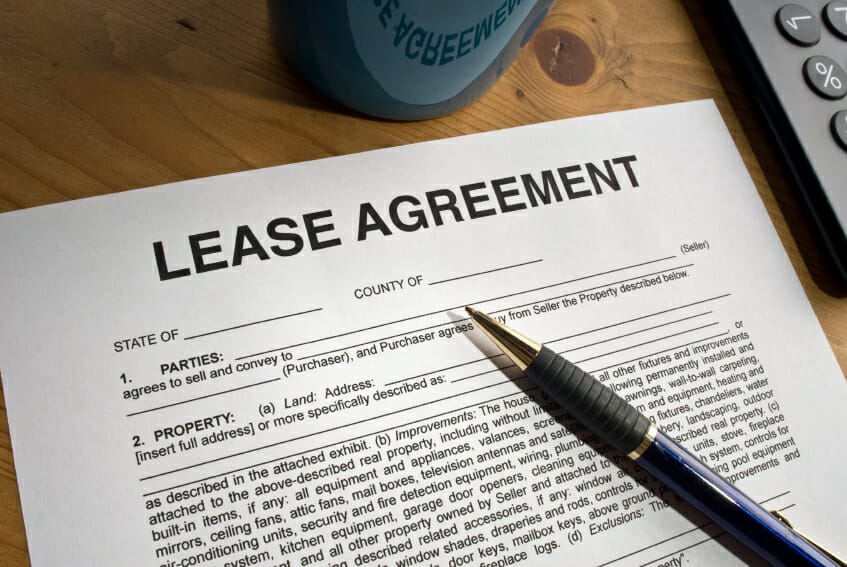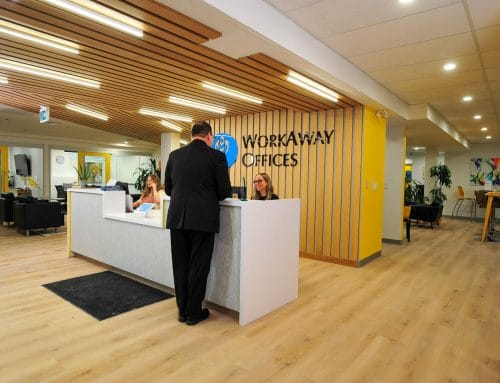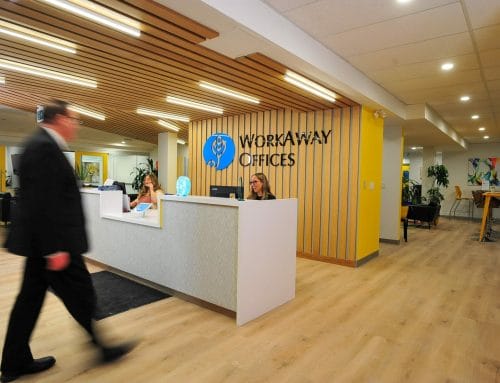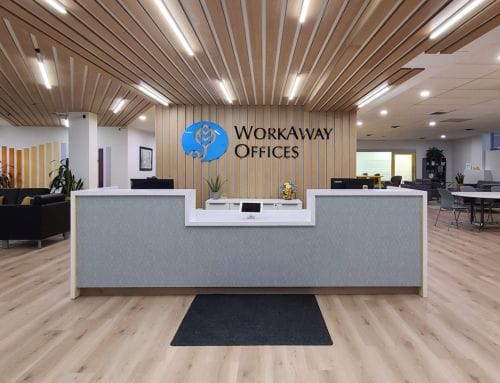Let’s say that you’ve been running a small business from your home, and it’s not really working out for you anymore, so you decide it’s time to look for some office space. As you embark on your search, be sure to consider some important factors before you sign an office lease.
An office lease is a legal contract between you and the landlord, which states the terms and conditions on the space that you plan to rent. A typical landlord will ask for a 3, 5 or 10-year term lease that will lock you into the space, along with the terms and conditions of the lease agreement. Landlords are rarely flexible, and will rely on the strength of the lease agreement to ensure that all tenants live up to their commitments and obligations.
1. What About Flexibility?
Understandably, many small and especially new companies will be reluctant to commit themselves to a 5-year lease, when they can’t predict where their company will be in 6 months from now.
Young and growing companies require flexibility when it comes to their office needs. It may be very hard to get, but it’s important to seek flexibility in order to be sure you can add or reduce space, if and when necessary. While this is critically important, it can be extremely difficult for many small businesses to negotiate these terms with their lease.
2. Expense of Office Improvements
The capital expenditures required to make improvements to the leased office space will be the tenant’s responsibility. You might be very fortunate and find a space that works for you on an ‘as is’ basis, but if it doesn’t, you’ll want to budget for expenses related to adding new walls, offices, meeting rooms, kitchen, bathroom, reception area, work permits, contractors, electrical, mechanical and plumbing.
Depending on the landlord, you may be able to negotiate some partial financial assistance, but you can safely assume that most landlords wouldn’t be overly excited to help finance improvements for small spaces, especially if the lease is for a short term. Therefore, most landlords will require that you sign at minimum a 5-year lease in order for them to recapture their costs for any office enhancements.
3. Size of Space Needed
If you work alone, or within a small group, you will likely require a small space. In some areas, it may be difficult to find independent space that is smaller than 1,000 square feet. While having room to grow would be nice, you may end up having to pay for more space than you really need.
4. Triple Net Leases
Having a triple net lease means that along with paying the monthly rent for the space you are renting, you will also have to pay for a portion of the associated operating expenses that the landlord pays to maintain that space. Operating expenses include the cost of heating & cooling, property taxes, electricity, landscaping, snow removal, general repairs, maintenance, cleaning, administration and costs associated with the common areas of the building.
Common area expenses reflect the costs associated with maintaining the common areas of a property, such as lobbies, hallways, common bathrooms and elevators. The expenses to look after these areas are shared on a proportionate basis with all tenants in the building.
Depending on your location, all of the above expenses can range in price. In Ottawa, Ontario for example, you can expect to pay an additional $10 to $15 per square foot per year towards operating expenses. This could potentially double your monthly rental expenses.
5. Other Office Related Expenses
There is always a variety of additional capital expenditures and monthly expenses that you’ll incur when you rent a new office. Capital expenditures will include furniture, wall art, reception area décor, filing cabinets, servers and IT expenses, kitchen appliances and other office related equipment. Monthly expenses that you’ll have to budget for will be WiFi, alarm monitoring, office cleaning, kitchen and office supplies. You may be shocked to see how these additional costs can add up.
6. Have you considered Co-Working & Shared Offices?
Small businesses, start-ups and work-from-home entrepreneurs and employees have been flocking to co-working spaces and shared offices in droves. Why? Because these spaces offer lots of flexibility, convenience and time-saving benefits. Desks and offices can be rented on a daily, weekly and monthly basis, with no long-term commitments. If you need more or less space, you’ll have the flexibility to make changes to suit your needs.
What’s great is that in most cases, everything is included, such as WiFi, access to printers, professionally furnished meeting rooms, kitchens, security, office cleaning, and free coffee & tea.
7. Check out WorkAway Offices
WorkAway Offices is a thriving co-working and shared office facility in central Ottawa, Ontario. At WorkAway, you’ll have access to beautiful, professionally furnished and functional offices, meeting rooms and shares spaces.
Let’s say that you’ve been running a small business from your home, and it’s not really working out for you anymore, so you decide it’s time to look for some office space. As you embark on your search, be sure to consider some important factors before you sign an office lease.
An office lease is a legal contract between you and the landlord, which states the terms and conditions on the space that you plan to rent. A typical landlord will ask for a 3, 5 or 10-year term lease that will lock you into the space, along with the terms and conditions of the lease agreement. Landlords are rarely flexible, and will rely on the strength of the lease agreement to ensure that all tenants live up to their commitments and obligations.
1. What About Flexibility?
Understandably, many small and especially new companies will be reluctant to commit themselves to a 5-year lease, when they can’t predict where their company will be in 6 months from now.
Young and growing companies require flexibility when it comes to their office needs. It may be very hard to get, but it’s important to seek flexibility in order to be sure you can add or reduce space, if and when necessary. While this is critically important, it can be extremely difficult for many small businesses to negotiate these terms with their lease.
2. Expense of Office Improvements
The capital expenditures required to make improvements to the leased office space will be the tenant’s responsibility. You might be very fortunate and find a space that works for you on an ‘as is’ basis, but if it doesn’t, you’ll want to budget for expenses related to adding new walls, offices, meeting rooms, kitchen, bathroom, reception area, work permits, contractors, electrical, mechanical and plumbing.
Depending on the landlord, you may be able to negotiate some partial financial assistance, but you can safely assume that most landlords wouldn’t be overly excited to help finance improvements for small spaces, especially if the lease is for a short term. Therefore, most landlords will require that you sign at minimum a 5-year lease in order for them to recapture their costs for any office enhancements.
3. Size of Space Needed
If you work alone, or within a small group, you will likely require a small space. In some areas, it may be difficult to find independent space that is smaller than 1,000 square feet. While having room to grow would be nice, you may end up having to pay for more space than you really need.
4. Triple Net Leases
Having a triple net lease means that along with paying the monthly rent for the space you are renting, you will also have to pay for a portion of the associated operating expenses that the landlord pays to maintain that space. Operating expenses include the cost of heating & cooling, property taxes, electricity, landscaping, snow removal, general repairs, maintenance, cleaning, administration and costs associated with the common areas of the building.
Common area expenses reflect the costs associated with maintaining the common areas of a property, such as lobbies, hallways, common bathrooms and elevators. The expenses to look after these areas are shared on a proportionate basis with all tenants in the building.
Depending on your location, all of the above expenses can range in price. In Ottawa, Ontario for example, you can expect to pay an additional $10 to $15 per square foot per year towards operating expenses. This could potentially double your monthly rental expenses.
5. Other Office Related Expenses
There is always a variety of additional capital expenditures and monthly expenses that you’ll incur when you rent a new office. Capital expenditures will include furniture, wall art, reception area décor, filing cabinets, servers and IT expenses, kitchen appliances and other office related equipment. Monthly expenses that you’ll have to budget for will be WiFi, alarm monitoring, office cleaning, kitchen and office supplies. You may be shocked to see how these additional costs can add up.
6. Have you considered Co-Working & Shared Offices?
Small businesses, start-ups and work-from-home entrepreneurs and employees have been flocking to co-working spaces and shared offices in droves. Why? Because these spaces offer lots of flexibility, convenience and time-saving benefits. Desks and offices can be rented on a daily, weekly and monthly basis, with no long-term commitments. If you need more or less space, you’ll have the flexibility to make changes to suit your needs.
What’s great is that in most cases, everything is included, such as WiFi, access to printers, professionally furnished meeting rooms, kitchens, security, office cleaning, and free coffee & tea.
7. Check out WorkAway Offices
WorkAway Offices is a thriving co-working and shared office facility in central Ottawa, Ontario. At WorkAway, you’ll have access to beautiful, professionally furnished and functional offices, meeting rooms and shares spaces.




